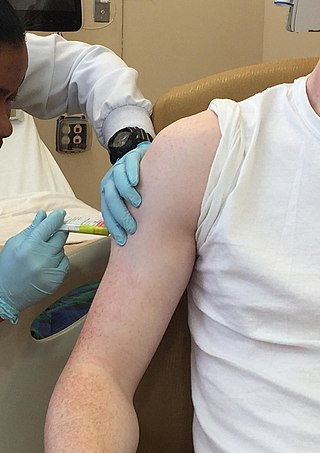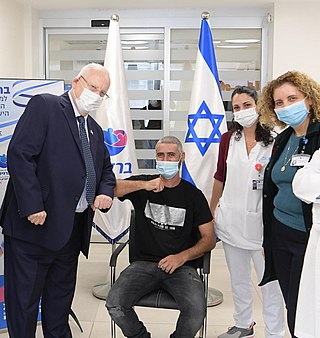Related Research Articles
Evidence-based medicine (EBM) is "the conscientious, explicit and judicious use of current best evidence in making decisions about the care of individual patients." The aim of EBM is to integrate the experience of the clinician, the values of the patient, and the best available scientific information to guide decision-making about clinical management. The term was originally used to describe an approach to teaching the practice of medicine and improving decisions by individual physicians about individual patients.

A randomized controlled trial is a form of scientific experiment used to control factors not under direct experimental control. Examples of RCTs are clinical trials that compare the effects of drugs, surgical techniques, medical devices, diagnostic procedures or other medical treatments.

Clinical trials are prospective biomedical or behavioral research studies on human participants designed to answer specific questions about biomedical or behavioral interventions, including new treatments and known interventions that warrant further study and comparison. Clinical trials generate data on dosage, safety and efficacy. They are conducted only after they have received health authority/ethics committee approval in the country where approval of the therapy is sought. These authorities are responsible for vetting the risk/benefit ratio of the trial—their approval does not mean the therapy is 'safe' or effective, only that the trial may be conducted.

The number needed to treat (NNT) or number needed to treat for an additional beneficial outcome (NNTB) is an epidemiological measure used in communicating the effectiveness of a health-care intervention, typically a treatment with medication. The NNT is the average number of patients who need to be treated to prevent one additional bad outcome. It is defined as the inverse of the absolute risk reduction, and computed as , where is the incidence in the treated (exposed) group, and is the incidence in the control (unexposed) group. This calculation implicitly assumes monotonicity, that is, no individual can be harmed by treatment. The modern approach, based on counterfactual conditionals, relaxes this assumption and yields bounds on NNT.

In fields such as epidemiology, social sciences, psychology and statistics, an observational study draws inferences from a sample to a population where the independent variable is not under the control of the researcher because of ethical concerns or logistical constraints. One common observational study is about the possible effect of a treatment on subjects, where the assignment of subjects into a treated group versus a control group is outside the control of the investigator. This is in contrast with experiments, such as randomized controlled trials, where each subject is randomly assigned to a treated group or a control group. Observational studies, for lacking an assignment mechanism, naturally present difficulties for inferential analysis.
In natural and social science research, a protocol is most commonly a predefined procedural method in the design and implementation of an experiment. Protocols are written whenever it is desirable to standardize a laboratory method to ensure successful replication of results by others in the same laboratory or by other laboratories. Additionally, and by extension, protocols have the advantage of facilitating the assessment of experimental results through peer review. In addition to detailed procedures, equipment, and instruments, protocols will also contain study objectives, reasoning for experimental design, reasoning for chosen sample sizes, safety precautions, and how results were calculated and reported, including statistical analysis and any rules for predefining and documenting excluded data to avoid bias.

Toxicology testing, also known as safety assessment, or toxicity testing, is the process of determining the degree to which a substance of interest negatively impacts the normal biological functions of an organism, given a certain exposure duration, route of exposure, and substance concentration.
Data verification is a process in which different types of data are checked for accuracy and inconsistencies after data migration is done. In some domains it is referred to Source Data Verification (SDV), such as in clinical trials.

NS-2359 (GSK-372,475) is a serotonin-norepinephrine-dopamine reuptake inhibitor. It was under development by GlaxoSmithKline (GSK) as an antidepressant, but was discontinued in 2009 when phase II clinical trials showed the drug was not effective and not well tolerated. The results did not support further effort by the company. NS-2359 was also in clinical trials for the treatment of ADHD, phase II having been completed in 2007. A phase I clinical trial exploring the effect of NS-2359 on cocaine-dependent individuals was completed in 2002.
Cytel is a multinational statistical software developer and contract research organization, headquartered in Cambridge, Massachusetts, USA. Cytel provides clinical trial design, implementation services, and statistical products primarily for the biotech and pharmaceutical development markets.
Predictive probability of success (PPOS) is a statistics concept commonly used in the pharmaceutical industry including by health authorities to support decision making. In clinical trials, PPOS is the probability of observing a success in the future based on existing data. It is one type of probability of success. A Bayesian means by which the PPOS can be determined is through integrating the data's likelihood over possible future responses.
An outcome measure, endpoint, effect measure or measure of effect is a measure within medical practice or research, which is used to assess the effect, both positive and negative, of an intervention or treatment. Measures can often be quantified using effect sizes. Outcomes measures can be patient-reported, or gathered through laboratory tests such as blood work, urine samples etc. or through medical examination. Outcomes measures should be relevant to the target of the intervention.

The National Centre for the Replacement, Refinement and Reduction of Animals in Research is a British organization with the goal of reducing the number of animals used in scientific research. It is named after the three Rs principles, first described in 1959, for reducing the scale and impact of animal research. It was established in 2004 after the publication of a 2002 House of Lords select committee report on Animals In Scientific Procedures As of 2021, the chief executive of NC3Rs is Dr Vicky Robinson, who was appointed CBE in the 2015 Birthday Honours "For services to Science and Animal Welfare".

BriLife, also known as IIBR-100, is a replication-competent recombinant VSV viral vectored COVID-19 vaccine candidate. It was developed by the Israel Institute for Biological Research (IIBR). The IIBR partnered with the US-based NRx Pharmaceuticals to complete clinical trials and commercialize the vaccine. A study conducted in hamsters suggested that one dose of the vaccine was safe and effective at protecting against COVID-19.

V-01 is a protein subunit COVID-19 vaccine candidate developed by a subsidiary of Livzon Pharmaceutical Group Inc.

COVAX-19 is a recombinant protein-based COVID-19 vaccine developed by South Australian-based biotech company Vaxine, in collaboration with CinnaGen, a private company with operations in the Middle East. It is under clinical trial in collaboration with the Iranian company CinnaGen.

Noora is a COVID-19 vaccine candidate developed by Baqiyatallah University of Medical Sciences in collaboration with Plasma Darman Sarv Sepid Co. in Iran.

S-268019-b is a protein subunit COVID-19 vaccine candidate developed by Shionogi.

LYB001 is a COVID-19 vaccine candidate developed by Yantai Patronus Biotech Co., Ltd.

Stemirna COVID-19 vaccine is a COVID-19 vaccine candidate developed by Stemirna Therapeutics.
References
- ↑ Singh, J (April 2014). "Randomization and online databases for clinical trials". Journal of Pharmacology & Pharmacotherapeutics. 5 (2): 173–4. doi: 10.4103/0976-500X.130155 . ISSN 0976-500X. PMC 4008924 . PMID 24799829.